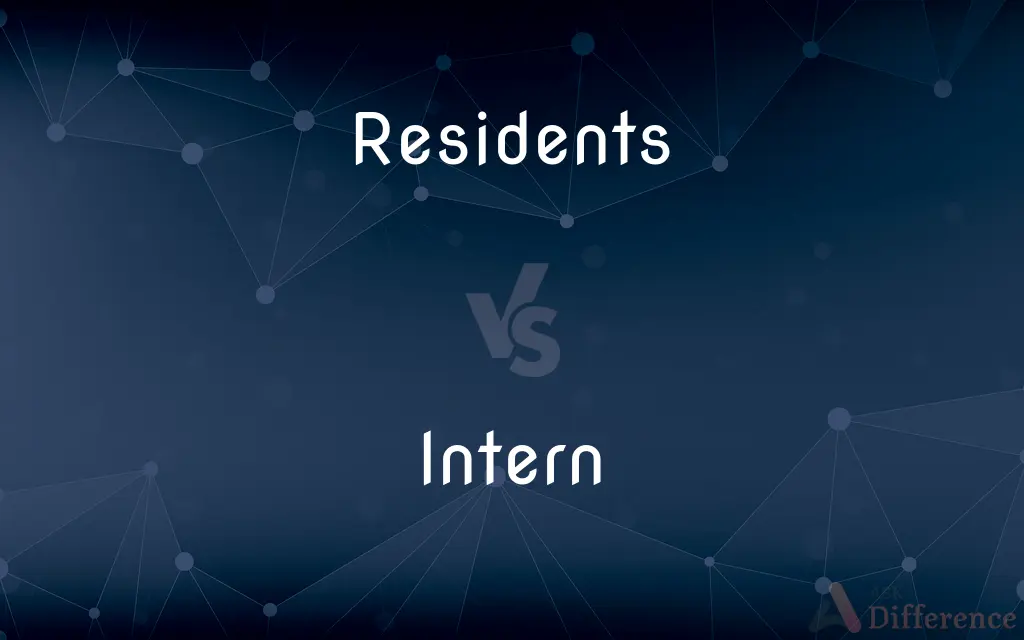Residents vs. Intern — What's the Difference?
By Urooj Arif & Maham Liaqat — Published on February 26, 2024
Residents are physicians in postgraduate training who have completed their internship, focusing on specialized medical practice. Interns are physicians in their initial year of postgraduate training, gaining broad medical experience before specializing.

Difference Between Residents and Intern
Table of Contents
ADVERTISEMENT
Key Differences
The journey to becoming a fully licensed physician involves several stages, with internships and residencies providing crucial hands-on experience. An intern, or first-year resident, embarks on this journey immediately after graduating from medical school. During this initial year, interns rotate through various medical specialties, such as surgery, pediatrics, and internal medicine, to gain a broad understanding of different fields.
Upon completing the internship, physicians advance to residency, which may last from three to seven years, depending on the specialty. As residents, they choose a specific field to specialize in, such as cardiology or neurology, receiving in-depth training in their chosen area. Residents have more responsibility than interns and often supervise interns while still being under the guidance of senior physicians.
Both interns and residents work in hospital settings, but their roles and responsibilities evolve as they progress through their training. While interns are gaining exposure to a wide range of medical disciplines to build a comprehensive skill set, residents are focused on becoming experts in a particular specialty. This progression ensures that by the end of their residency, physicians are well-prepared to provide specialized care or pursue further training in fellowships if they choose.
The distinction between residents and interns highlights the structured nature of medical training, which is designed to equip new physicians with the knowledge, skills, and experience necessary to provide high-quality care to patients.
Comparison Chart
Stage of Training
Initial year of postgraduate training
Advanced postgraduate training
ADVERTISEMENT
Focus
Broad medical experience
Specialization in a specific field
Responsibilities
Rotations in various specialties, basic patient care
Supervising interns, advanced patient care, complex procedures
Supervision
Closely supervised by senior physicians
Supervise interns, less direct supervision from senior physicians
Duration
1 year
3 to 7 years, depending on the specialty
Compare with Definitions
Residents
Work under close supervision.
Each intern is closely monitored by a resident or attending physician during their rotations.
Intern
Engaged in in-depth training in their chosen specialty.
Residents attend specialized seminars and workshops beyond their hospital duties.
Residents
Engage in basic patient care.
Interns often conduct patient interviews and participate in minor procedures.
Intern
Have more autonomy and responsibility than interns.
Residents can perform more complex procedures with less supervision.
Residents
The first step in their medical career.
Completing an internship is crucial for moving on to a residency program.
Intern
Serve as a bridge between interns and attending physicians.
Residents communicate interns' findings and concerns to the attending staff.
Residents
Newly graduated physicians in their first year of postgraduate training.
The intern rotated through the emergency department to gain acute care experience.
Intern
Physicians specializing in a particular field after completing their internship.
The resident in cardiology led the discussion on patient care plans.
Residents
Focus on gaining a broad range of medical skills.
Interns experience different specialties to understand where their interests lie.
Intern
Supervise interns and medical students.
The surgical resident oversees interns during rounds.
Intern
A student or a recent graduate undergoing supervised practical training.
Intern
A physician who has recently graduated from medical school and is learning medical practice in a hospital under supervision, prior to beginning a residency program.
Intern
A medical student or recent graduate working in a hospital as a final part of medical training.
Intern
An advanced student or graduate in medicine gaining supervised practical experience (`houseman' is a British term)
Common Curiosities
What is the main difference between an intern and a resident?
An intern is in their first year of postgraduate training, while a resident has moved beyond the first year to specialize in a particular medical field.
Do residents still receive supervision?
Yes, residents are supervised by more senior physicians, though with more autonomy than interns.
Can interns specialize in a medical field?
Interns gain broad medical experience without specializing; specialization occurs during residency.
How long does a residency last?
Residency duration varies from 3 to 7 years, depending on the medical specialty.
Can a resident perform surgery?
Residents in surgical specialties perform surgeries under supervision and gain more independence as they progress.
How do residents advance in their training?
Residents advance by taking on increased responsibilities, engaging in specialized medical practices, and often conducting research or teaching medical students.
What is the significance of choosing a specialty for a resident?
Choosing a specialty allows a resident to focus their training on a specific area of medicine, developing deep expertise and skills necessary for expert patient care in that field.
Are interns considered doctors?
Yes, interns are licensed physicians in their first year of postgraduate training.
Is the internship mandatory for all physicians?
Yes, completing an internship is a required step in the training of all physicians.
What happens after completing a residency?
After residency, physicians are fully qualified to practice in their specialty or may pursue further fellowship training for sub-specialization.
Do residents have more responsibilities than interns?
Yes, residents take on more complex tasks and often supervise interns.
What opportunities are available for residents after completing their program?
After residency, physicians may enter independent practice, join a group practice, pursue fellowships for further specialization, engage in research, or explore opportunities in academic medicine.
What determines the length of a residency program?
The length of residency is determined by the complexity and requirements of the chosen specialty, with surgical and subspecialty programs generally requiring longer training periods.
How do interns and residents contribute to patient care?
Interns and residents are integral to the healthcare team, providing patient care under supervision while honing their medical skills.
What roles do interns play in a hospital setting?
Interns assist in patient care, perform basic medical procedures, and participate in rotations across various departments to gain a wide scope of medical knowledge.
What challenges do interns face in their first year?
Interns often face challenges such as adapting to long working hours, managing the responsibilities of patient care, and learning to work effectively within a healthcare team.
Can residents switch specialties during their training?
While challenging due to the structured nature of medical education, switching specialties is possible but may require completing additional internship years or entering a new residency program.
How are interns and residents evaluated during their training?
They are evaluated through a combination of direct observation, feedback from supervisors and peers, standardized exams, and assessment of their clinical skills and knowledge application.
What impact do interns and residents have on patient care?
Interns and residents play a critical role in patient care, often serving as primary caregivers in hospital settings and ensuring continuous patient monitoring and treatment.
How do residency programs prepare physicians for independent practice?
Residency programs provide comprehensive training in a medical specialty, including advanced clinical skills, patient management strategies, and ethical and professional standards, preparing physicians for independent practice.
Share Your Discovery

Previous Comparison
Psychologically vs. Physiologically
Next Comparison
Hard Wax vs. Soft WaxAuthor Spotlight
Written by
Urooj ArifUrooj is a skilled content writer at Ask Difference, known for her exceptional ability to simplify complex topics into engaging and informative content. With a passion for research and a flair for clear, concise writing, she consistently delivers articles that resonate with our diverse audience.
Co-written by
Maham Liaqat















































